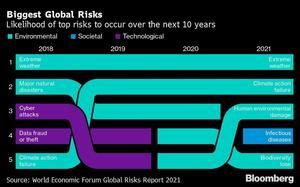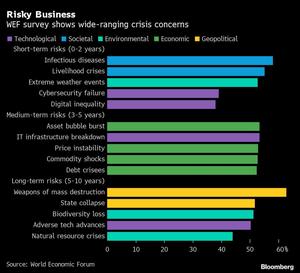 A healthcare worker provides care for a COVID-19 patient in the intensive care unit (ICU) at the Saint Joseph hospital in Marseille, France, Nov 20, 2020. (JEREMY SUYKER / BLOOMBERG)
A healthcare worker provides care for a COVID-19 patient in the intensive care unit (ICU) at the Saint Joseph hospital in Marseille, France, Nov 20, 2020. (JEREMY SUYKER / BLOOMBERG)
The coronavirus has exposed the “catastrophic effects” of ignoring long-term risks such as pandemics, and the economic and political consequences could cause more crises for years to come, according to the World Economic Forum.
The WEF’s annual survey of global risks lists infectious disease and livelihood crises as the top “clear and present dangers” over the next two years. Knock-on effects such as asset bubbles and price instability lead concerns over 3-5 years.
The WEF’s annual survey of global risks lists infectious disease and livelihood crises as the top “clear and present dangers” over the next two years. Knock-on effects such as asset bubbles and price instability lead concerns over 3-5 years
ALSO READ: WHO chief: Vaccine nationalism could prolong pandemic
The WEF said most countries struggled with crisis management during the pandemic, despite some remarkable examples of determination and cooperation. That highlights how leaders need to prepare better for whatever the next major shock turns out to be.
Risky Business
“The immediate human and economic cost of COVID-19 is severe,” the WEF said in the report. “The ramifications -- in the form of social unrest, political fragmentation and geopolitical tensions -- will shape the effectiveness of our responses to the other key threats of the next decade.”
While the impact of the pandemic is dominant at the moment, other events will likely come to the fore, according to the survey. As in previous years, extreme weather is seen as the most-likely risk, just ahead of a failure on climate action. Infectious diseases make the top five for the first time in at least a decade.

Digital inequality and the concentration of digital power are also seen as major concerns, with WEF Managing Director Saadia Zahidi warning of a global “bifurcation in terms of growth and development.”
ALSO READ: OECD cuts global forecast, warns govts to maintain support
“There are parts of the world that have digital access and inclusivity and that is where some parts of the workforce -- not all -- are able to continue, are able to adapt,” she told Bloomberg Television on Tuesday. “But then there’s this other part of the world where we don’t even have basic internet access, basic electricity access, basic water access and that is where recovery and a return to growth will look very different.”
Biggest Global Risks
The WEF’s recommendations for boosting resilience include combating misinformation, especially as coronavirus vaccines are rolled out. It cited one example of false information -- that ingesting highly concentrated alcohol kills COVID-19 -- which caused more than 700 deaths and nearly 6,000 hospitalizations in Iran.
More broadly, it said post-truth politics are “amplifying hate speech, heightening the risk of conflict, violence and human rights violations, and threatening long-term prospects for advancing democracy.”
The forum also recommended “holistic” risk analysis, investing in “risk champions” to encourage international cooperation, and exploring new forms of risk management such as public-private partnerships.
READ MORE: China's stable foreign trade to help boost global economic recovery
“If lessons from this crisis only inform decision-makers how to better prepare for the next pandemic -- rather than enhancing risk processes capabilities and culture -- the world will be again planning for the last crisis rather than anticipating the next,” the WEF said.



